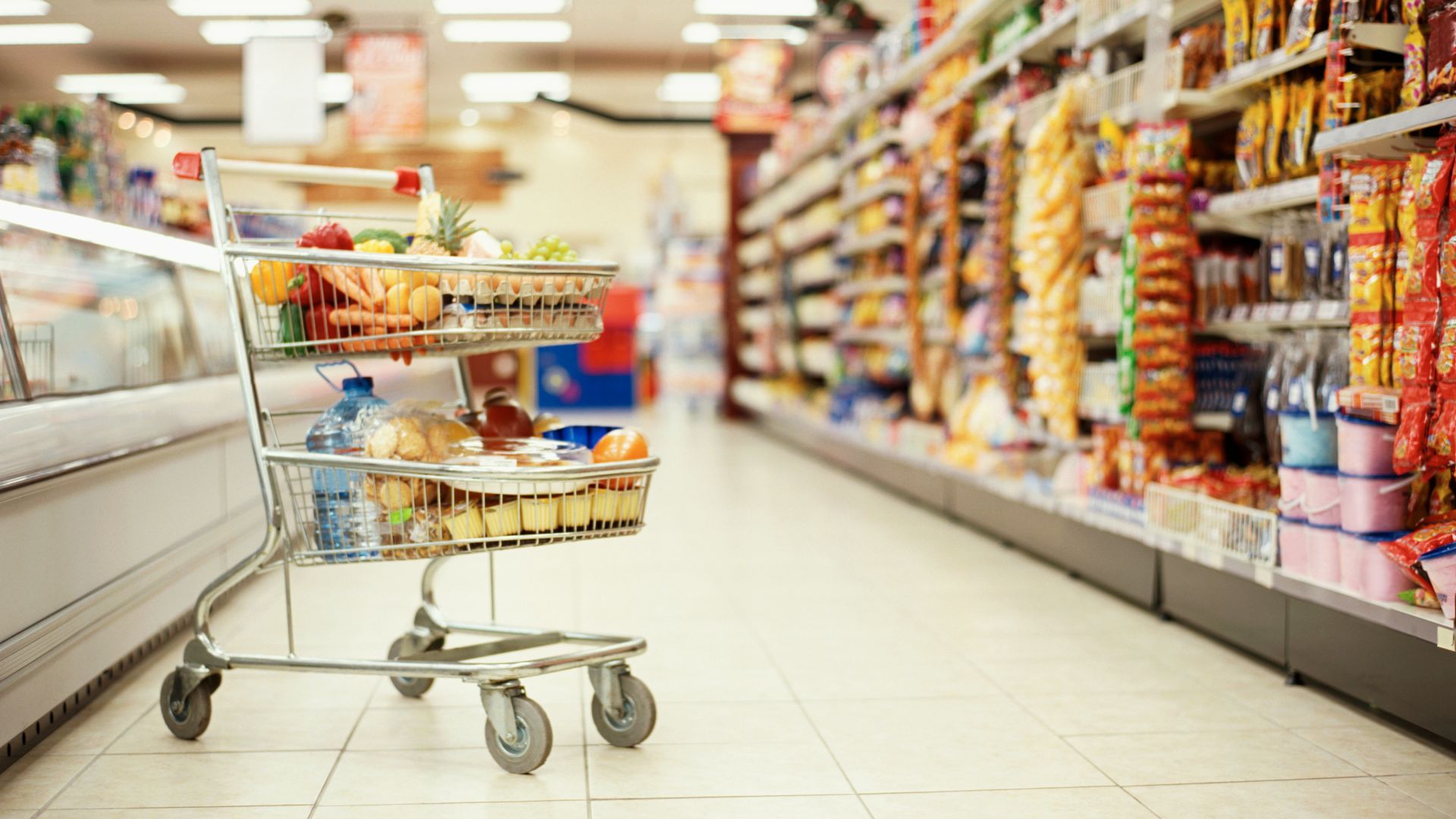Top Supermarket Chains in Germany [2026-2030]
Written by
Kinga EdwardsPublished on
Discover the top supermarket chains in Germany. Explore the leading grocery stores making waves in the German market – read more!

If you’re curious about the top supermarkets in Germany, you’re in for a treat.
Whether you’re in the business or just love getting the best deals, this article is for you. We’ve rounded up the top 12 supermarket chains in Germany by turnover. From Edeka’s massive presence to Aldi’s unbeatable prices, there’s plenty to find out.
Our list will help you understand what makes these supermarket giants tick and how they keep their customers coming back for more.
Plus, get ready for some extra facts and tips for your business:
Top supermarket chains in Germany
Germany’s supermarket scene is full of action, with familiar names battling it out for the top spot. From the low-cost powerhouses like Aldi and Lidl to the more spacious hypermarkets, there’s no shortage of choice when it comes to stocking up.
In this section, with data from Lebensmittel Praxis, we’re diving into the top supermarket chains in Germany, looking at their sales, forecasts, and what makes them stand out.
1. Edeka
Sales: €82.465 billion (2024)
CAGR forecast (2017–26): ~2.8%
Outlook 2026–2030:
Edeka is expected to maintain steady growth and market leadership, driven by ongoing expansion and vertical integration. Recent acquisitions (e.g., former Real hypermarket locations) have bolstered Edeka’s sales base. The group’s total revenue hit a record €75.3 billion in 2024, up 6.5% from the prior year.
Edeka operates various banners (Marktkauf, Netto Marken-Discount, NP Discount, diska, SPAR Express) with around 11,000 stores nationwide (10,859 at the end of 2024). In 2023, Edeka and its Netto discounter chain created roughly 2,300 new jobs and trained 19,240 young people, reinforcing their status as one of Germany’s largest private employers.
To help consumers amid inflation, Edeka invested heavily in price reductions, permanently cutting prices on over 3,200 products by the end of 2023. This pricing strategy, along with a partnership with the Payback loyalty program launched in 2025, has helped Edeka keep customer traffic high.
Edeka remains Germany’s grocery behemoth, with thousands of stores from neighborhood markets to large hypermarkets. The group continues investing in pricing and expansion to retain its market-leading position.
2. REWE (REWE Group)
Sales: €64.873 billion (2024)
CAGR forecast (2024–26): ~4.2%
Outlook 2026–2030:
REWE is Germany’s second-largest supermarket operator (after Edeka) and continues to grow steadily. The group operates 3,800+ stores nationwide under REWE (full-line supermarkets and REWE City) and additional stores, like Penny (discount), Nahkauf (franchise grocers), and others. In April 2023, REWE opened Germany’s first fully plant-based supermarket in Berlin (branded “REWE voll pflanzlich”) to tap into rising vegan product demand.
Looking ahead, REWE Group has announced a massive €16 billion investment program through 2028 to modernize its infrastructure, expand digital services, and upgrade stores. This includes new store formats (such as smaller autonomous stores and “Green Farming” concept stores with rooftop greenhouses) and continued expansion of online grocery via its stake in delivery service Flink.
REWE’s moderate growth is expected to continue into 2030 as it focuses on omnichannel retail and strategic expansion in Germany and Central Europe. With a resilient customer base and innovation in product assortment, REWE is well-positioned to remain a top 3 grocer in Germany through the end of the decade.
3. Lidl & Kaufland (Schwarz Group)
Sales: €31.960 billion & €23.200 billion (2024)
Sales growth 2024: 5.3%, 2.9%
Outlook 2026–2030:
As part of the Schwarz Group, Lidl and Kaufland form Europe’s largest retail group, and they continue to grow strongly. Lidl alone operates about 3,239 stores in Germany, while Kaufland has around 782 – together over 4,000 stores.
The Schwarz Group has been investing heavily: about €8 billion in 2023 for modernizing stores, new warehouses, and securing supply chains. Moreover, Lidl’s agility and aggressive pricing (it reported +5.7% sales growth in Germany for 2024, outperforming rivals) suggest it will continue gaining market share through 2030. Kaufland, while growing slower than Lidl, is expanding its online marketplace and remodeling stores.
Overall, Schwarz Group is poised to remain a powerhouse – analysts expect it to challenge Edeka’s top position as the 2020s progress, with Lidl potentially overtaking competitors in the domestic discount segment by the end of the decade.
Lidl (Schwarz Group) is one of Germany’s largest discounters by revenue, with aggressive expansion and digital innovation fueling its growth. Sister chain Kaufland complements Lidl with large-format stores.
4. Aldi (Nord & Süd)
Sales: €35.840 billion (2024)
Market share targeting to 2030: 4.5%
Outlook 2026–2030:
Aldi, the pioneer of discount retail, remains a heavyweight with 4,211 stores across Germany. To regain momentum, Aldi has been pursuing a strategy of weekly special offers and deep price cuts – often up to 50% off on select items – to reinforce its price-leadership image. These aggressive promotions, along with Aldi’s famous limited-time “Special Buys”, keep customers coming back for bargains. In 2023–2024, Aldi also streamlined its product range and invested in store remodels (brighter, more modern layouts) to improve the shopping experience.
Aldi’s market share in Germany has been relatively flat, so looking toward 2030, the chain is focusing on e-commerce (e.g., expanding Aldi’s online grocery pilot) and small urban store formats to drive growth. Moreover, forecasts to 2030 anticipate Aldi will manage modest growth if it can innovate beyond its traditional model. However, competition is fierce, so Aldi’s success will hinge on maintaining its lowest-price guarantee while adapting to changing consumer habits.
Despite challenges, Aldi’s global strength and brand recognition mean it will remain a key player in the German grocery landscape through 2030. Its attractive pricing strategy and good quality ensure its strong position. If Aldi adapts to the rapidly changing market, it will remain stable.
5. Lekkerland (REWE Group)
Sales: €15.1 billion (2024)
Outlook 2026–2030:
Lekkerland is the leading convenience wholesale and distribution network in Germany, supplying fuel station shops, kiosks, convenience stores, and other “on-the-go” retailers. Now part of REWE Group (acquired in 2019), Lekkerland operates an impressive 61,000 points of sale in Europe.
Lekkerland’s growth reflects recovery in out-of-home consumption and new business wins. A key partnership is with Aral/BP: Lekkerland’s supply contract with Aral (Germany’s largest gas station chain) was extended until 2028, ensuring it remains deeply embedded in the petrol station retail channel.
Going forward, Lekkerland is focusing on expanding its food-to-go and snack offerings and leveraging REWE’s buying power for efficiency. By 2030, the convenience segment is expected to grow as consumers seek quick, on-the-go options, and Lekkerland (with its motto “The Convenience Company”) is forecast to maintain stable growth.
Under REWE’s umbrella, this supermarket chain in Germany will continue dominating the convenience wholesale market in Germany and beyond, while investing in innovations like automated micro-stores and digital ordering systems for its clients.
6. Bela (Bartels-Langness Gruppe)
Sales: €3.500 billion (2024)
Sales growth 2024: 3.2%
Outlook 2026–2030:
Bela, short for Bartels-Langness Handelsgesellschaft, is a regional retail and wholesale group based in Northern Germany. The Bartels-Langness Gruppe operates supermarkets under banners like Famila and Markant and cash & carry outlets (CITTI).
With approximately 130 retail stores of its own and a significant wholesale supply business, Bela is one of the largest family-owned grocery companies in Germany. Its multiple store formats (hypermarkets, supermarkets, cash & carry) cater to a wide range of customer needs, especially in Schleswig-Holstein and surrounding regions.
The group’s strategy focuses on local assortment and service to differentiate from national discounters.
Bartels-Langness is expected to grow modestly (low single-digit percent annually), as it faces intense competition from larger national chains. However, its strong regional brands and wholesale arm (supplying many independent grocers) provide stability.
7. Globus
Turnover: €6.663 billion (2024)
Sales growth 2024: 3.1%
Outlook 2026–2030:
Globus is a hypermarket operator known for its large one-stop stores, some of which include extensive non-food departments and even in-store restaurants. It currently runs about 65 hypermarkets in Germany and also has a presence abroad (like in the Czech Republic).
This supermarket chain is versatile, often adapting each store to local needs, and is still family-owned. A notable innovation is Globus’s partnership on electric vehicle infrastructure: teaming up with utility EnBW and Tesla, Globus is installing EV charging parks at about 50 of its store locations by the end of 2024.
Looking towards 2030, Globus aims to continue modernizing its hypermarkets with new services and sustainability features (for example, some locations have on-site organic gardens or solar panels).
The hypermarket format in general faces headwinds (as some consumers shift to smaller formats or online), but this supermarket chain in Germany has carved out a loyal customer base by emphasizing extensive fresh food offerings, fair prices, and a pleasant shopping experience.
8. Metro Cash & Carry
Sales: €5.600 billion (2024)
Sales growth predictions 2024/2025: 3-7%
Outlook 2026–2030:
Metro AG’s Cash & Carry operates about 102 stores in Germany. It’s present in more than 30 countries worldwide, sells products via 623 wholesale stores, and connects with 94 delivery depots. The company serves professional customers and business customers (hotels, restaurants, caterers, and small retailers) with a multichannel marketing strategy.
Metro has a long history (founded in 1964). It invested €18 million in revamping its historic Düsseldorf campus headquarters and flagships, all to modernize the shopping experience and streamline operations. From 2023 onward, Metro’s strategy emphasizes digital ordering and delivery for its professional customers, as well as sustainability (reducing food waste and offering more local products to restaurateurs).
Through 2030, Metro is expected to see modest growth in Germany as the HoReCa (hotel/restaurant/catering) sector recovers and expands. Also, the company wants to increase the share of its own brands to over 35% by 2030.
Metro’s recent efforts to innovate should help maintain its position as the go-to cash & carry wholesaler for German businesses. Its focus on wholesale services means it’s less visible to everyday shoppers but remains truly a global player in food distribution.
9. Transgourmet (Transgourmet Deutschland GmbH & Co)
Turnover: €5.125 billion (2024)
Sales growth 2024: 1.9%
Outlook 2026–2030:
Transgourmet also belongs to the top supermarket chains in Germany. It was formed as a joint venture between Rewe (Germany) and Coop (Switzerland) in 2008, but Coop acquired full ownership by 2011. It has a strong focus on food service businesses like restaurants, hotels, and catering companies. Operating under various brands, including Selgros Cash & Carry, Transgourmet is a leading supplier of over 60,000 food and non-food products.
Transgourmet significantly improved its digital transformation with the integration of a robust multisite e-commerce platform using Drupal CMS and Commercetools for headless commerce. Moreover, the company’s customer-centric approach and its focus on AI-driven personalization and inventory management will continue to ensure its leadership in the food wholesale market in Europe.
By 2030, Transgourmet aims to remain a top player in the wholesale food industry, balancing innovation with cost-effectiveness. Its ongoing investment in e-commerce and multisite management solutions positions the company to thrive despite competitive pressures from both traditional wholesalers and digital-first competitors.
10. Norma
Sales: €4,739 billion (2024)
Sales growth 2024: 1.2%
Outlook 2026–2030:
Norma is a value-oriented discount supermarket chain, smaller than Aldi or Lidl but with a solid presence. It operates 1,339 stores domestically and also has branches in neighboring France, Austria, and Czechia. This supermarket chain in Germany competes with the other on similar no-frills, low-price principles.
In 2023, the company launched a comprehensive internal program called “Step Up” to drive global growth and efficiency. This initiative implemented a lot of measures to improve operations – from optimizing supply chains to refreshing store layouts and expanding the product range. The aim is to make Norma more agile and customer-focused in a challenging market.
Through 2026–2030, Norma’s growth will likely be modest; industry analysts forecast around 1–2% annual growth as the discount segment in Germany is quite saturated. However, Norma’s lean model and regional strengths (particularly in southern Germany) will help it remain a solid competitor. This supermarket chain is also investing in digital (e.g., a shopping app and scan-and-go technology) to stay relevant.
Norma is not expected to dramatically expand its market share by 2030. Yet, it will continue to be a reliable player in the German grocery market that focuses on efficiency and targeted store expansions.
Grocery retail in Germany and Europe
Curious about how the grocery scene looks in Germany and the whole Europe? Let’s dive into the most crucial information, backed by key stats for 2024/2025, from The State of Grocery Retail 2025 report!
Spoiler alert: discounters are still dominating, but there’s a lot more going on!
Private labels leading the charge
In 2024, private labels continued their upward trend, securing 39.1% of the total grocery sales value across Europe, with Germany following suit. Discounters, such as Aldi and Lidl, accounted for 23.2% of the market share, seeing growth, albeit slower than in 2023. The steady rise in private label adoption shows that consumers are still more than happy to go for budget-friendly options without sacrificing quality – especially with Gen Z leading the charge in favor of healthier options.
Snacks: Discounters rule the aisles
When it comes to snacks, discounters are your go-to, with 54% of consumers purchasing them at least once a month, along with other products like sandwiches, salads, and drinks. They’re perfect for picking up chips, chocolates, and quick treats without breaking the bank. Supermarkets follow, making it easy to grab your favorite snacks during regular shopping trips. This is shown in the modern retail revenue breakdown in Germany, where discounters reached 3.0 percentage change, and supermarkets a bit less, 2.8 percentage change.
Healthy food in the mood
The demand for healthy and functional foods is on the rise, particularly among Gen Z shoppers, who are driving the trend. These consumers are looking for foods that nourish and offer additional health benefits. Functional foods—think fortified snacks, protein-rich meals, and clean, natural options—are gaining ground. Gen Z leads the way, with 45% of them planning to focus more on healthy eating, compared to other generations.
However, many shoppers are still seeking affordable options, and 35% of consumers feel that their main grocer doesn’t offer the right healthy choices. This represents a great opportunity for grocers to fill the gap and cater to this health-conscious but price-sensitive crowd.
Retail channel growth and shifting consumer preferences
While volume growth in grocery retail has been low (projected at 0.2% annually through 2030), there are pockets of opportunity, especially in Northern and Southern Europe, where growth rates are higher. The shift from traditional trade to modern trade is expected to drive an annual growth in the market. And as foodservice channels continue to expand, convenience foods and ready-to-eat meals have become key categories. These segments cater to consumers looking for quick, hassle-free options.
Gen Z importance
Gen Z is becoming a dominant force in the grocery retail market, as almost half of them are planning to focus on healthy eating in 2025. They are also willing to pay a premium for healthier products, driving the demand for fresh, functional, and clean foods. This generation, along with millennials, is at the forefront of changing consumer preferences, as they seek high-protein, low-calorie, and convenient meal options.
Inside the mind of German shoppers
Allright, but what’s going on inside the heads of German shoppers these days? Here’s a look at what’s driving purchasing decisions and how German shoppers are responding to the current retail landscape.
Quality over price… but price still matters
Despite growing interest in quality products, price sensitivity remains high. In fact, 84% of consumers say they’ll stick with private label products even if their purchasing power improves. That’s a sign that, while people want good quality, they’re also not ready to pay a premium for it, especially when they know they can find similar products at a better price.
Sustainability – not a priority
When it comes to sustainability, consumers care about the environment, but many of them don’t plan to buy more sustainable products in 2025. Here, Gen Z and millennials are the most willing to pay more for sustainability, but they’re still not fully convinced it’s worth the extra cost. Thus, grocers need to strike the right balance between offering green options and keeping prices in check to appeal to today’s shoppers.
No time for cooking
Moreover, cooking is not a priority for many shoppers, like among Gen Z and millennials. These shoppers favor ready-to-eat meals, food-to-go, and anything that requires minimal prep time. In fact, 77% of Gen Z buys food on the go at least once a month, while 42% grab a ready-to-eat meal every week or more often. This trend is pushing grocery stores to rethink how they deliver convenience – because sometimes, a sandwich on the go is all it takes.
Tips for German businesses
Finally, if you’re a business owner, we’ve prepared helpful tips to operate with the supermarket chains in Germany better:
- Businesses can benefit by partnering with Edeka for broad market reach. Focus on quality and variety to match Edeka’s diverse offerings.
- Stay updated with tech trends. Consider investing in AI and smart solutions to streamline operations and improve customer experience.
- Keep an eye on emerging trends like plant-based products. Investing in employee satisfaction can lead to better service and customer loyalty.
- Using POS for retail can help supermarkets and grocery stores improve checkout efficiency, manage stock in real time, and streamline operations. With consumer expectations shifting towards faster and more seamless transactions, having the right point-of-sale system is key to staying competitive.
- Convenience is key. Streamline supply chains and focus on easy-to-access locations to attract on-the-go customers.
- Diversify your product range to cater to different customer segments. Multiple store formats can help reach a broader audience.
- Keep a modern and fresh store appearance. Investing in infrastructure can improve customer experience and operational efficiency.
- Continuous improvement programs can drive growth. Focus on efficiency measures to optimize operations and reduce costs.
- Partner with tech companies to offer additional services, like charging stations, to boost customer convenience and attract tech-savvy shoppers.
- Regular promotions and special offers can attract price-sensitive customers. Keep an eye on market conditions and adjust pricing strategies accordingly.
Wrap up
Germany’s supermarket scene is changing fast. Between tighter margins, smarter tech, and shoppers who want both value and values, the game is no longer just about who has the biggest store or the lowest price. Whether you’re a retailer, supplier, or simply curious about where your grocery euros go — keep an eye on how these top players adapt.
The next few years will shape how Germany eats, shops, and lives. And the ones who win? They won’t just sell food. They’ll fit seamlessly into everyday life.
***


